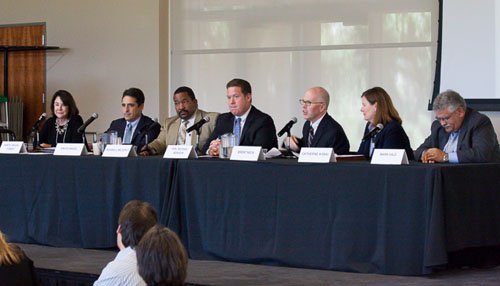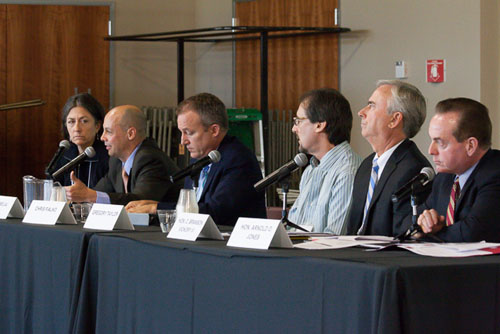“We believe it is part of our mission to do conviction integrity review,” said Santa Clara County District Attorney Jeff Rosen at the “In the Interest of Justice: Conviction Review Programs” symposium hosted by the Northern California Innocence Project (NCIP) at Santa Clara University on September 25. “It is fundamental to everything we do. It’s in our training; it’s in our policies; it’s in our protocols.”
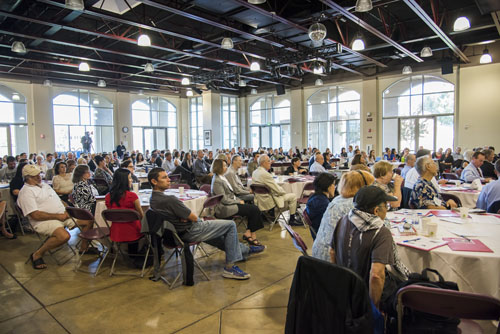
A full house of approximately 300 people attended NCIP’s “In the Interest of Justice: Conviction Review Programs” symposium.
Photo: Joanne H. Lee/Santa Clara University
Approximately 300 people—including prosecutors, defense attorneys, exonerees and judges—gathered at the groundbreaking event, emceed by retired Santa Clara County Superior Court Judge LaDoris Cordell, to discuss conviction review and to learn how conviction review programs work and how they can work better.
In recent years, several jurisdictions throughout the country have implemented conviction review programs to examine problematic convictions and to remedy mistakes, including freeing innocent people who were wrongly convicted and imprisoned. Most jurisdictions in California do not have a formal process for reviewing convictions.
Several attendees reported that as a result of NCIP’s symposium, they will be implementing conviction review programs in their locales.
“We are delighted that more California jurisdictions want to formalize their conviction review process,” said NCIP Policy Director Lucy Salcido Carter. “One of the goals of the symposium was to provide a forum for sharing information about how to implement innovative and effective conviction review practices.”
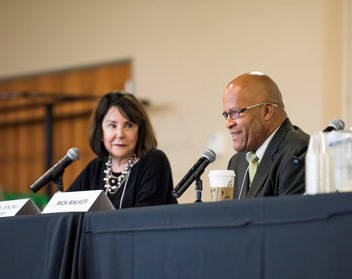
Karyn Sinunu-Towery and Rick Walker discuss Walker’s wrongful conviction and eventual exoneration. Photo: Joanne H. Lee/Santa Clara University
The symposium began with Karyn Sinunu-Towery, former Santa Clara County assistant district attorney, and exoneree Rick Walker discussing Walker’s case, which highlighted the need for formal conviction review procedures. At the time that new evidence in Walker’s case became available, there was no formal process for reviewing convictions, so attempts to address his claim of innocence stalled.
Walker’s exoneration finally came when county prosecutors decided to take a new approach to the case. “We looked at the facts differently. We put fresh eyes on everything,” said Sinunu-Towery. Walker’s advice to symposium participants was to “turn every stone over, every stone, every little bit of evidence that you get.”
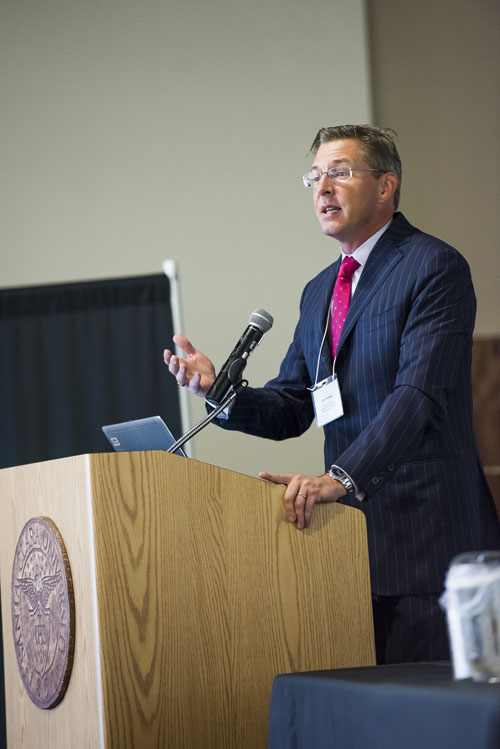
John Hollway provides attendees with information about the national landscape of conviction review. Photo: Joanne H. Lee/Santa Clara University
Keynote speaker John Hollway, executive director of the Quattrone Center for the Fair Administration of Justice, presented his research findings on conviction review programs nationwide. He defined conviction review units as organizations that conduct “extra-judicial, fact-based review of secured convictions to investigate plausible allegations of actual innocence” and noted that “conviction review units are really the institutional response to the innocence projects’ display of errors across the United States.”
Morning panelist Lake County, Illinois, State’s Attorney Michael Nerheim described the independent review panel he established to cut through cognitive bias that can occur when prosecutors review convictions secured by other prosecutors in the same office. “I thought the most effective way to try to pierce through that cognitive bias was to have people who don’t answer to me for a paycheck, who don’t know the office very well, don’t know the other attorneys very well, be the ones to bring those fresh sets of eyes to the cases,” said Nerheim.
Mark Hale, assistant district attorney for Kings County, New York, and head of the conviction review unit there, emphasized the fundamental obligation of prosecutors to ensure justice is done. “If you are serious about doing justice, a lot of times the right result is that you don’t win, the right result is that you don’t bring charges, the right result is that when you give it a second look, you withdraw those charges,” he said.
The Kings County conviction review unit is staffed with nine full-time attorneys, three detective investigators and two paralegals, and includes an independent review panel.
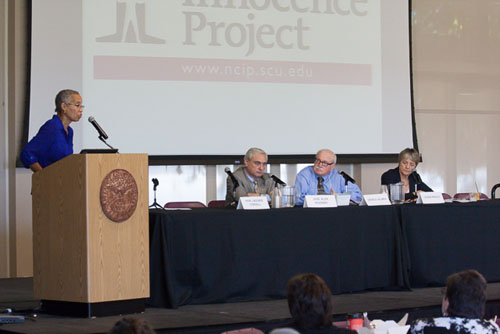
Event emcee Ladoris Cordell addresses lunchtime panelists Judge Alex Kozinski, Professor Jerry Uelmen and professor Cookie Ridolfi. Photo: Greg Pio
Lunchtime panelists—Ninth Circuit Court of Appeals Judge Alex Kozinski and Santa Clara University School of Law Professors Kathleen “Cookie” Ridolfi and Gerald Uelmen—highlighted the role conviction review programs can play in preventing wrongful convictions. “Conviction review needs to be looked at not just as a corrective mechanism to free the innocent who are in prison, but as a reformative mechanism. When we have discovered that a mistake has been made, what can we do to avoid making that mistake in the future?” opined Uelmen.
The early afternoon panel featured the North Carolina Innocence Inquiry Commission, a statewide model with unique access to post-conviction evidence. “The Commission and its subpoena power is really why I consider it the best post-conviction review organization out there because it can access the materials that others, even prosecutors’ offices because of their cognitive bias, are unable to find,” said panelist Jamie Lau, supervising attorney at the Center for Criminal Justice and Professional Responsibility at Duke Law and former staff attorney for the Commission.
Greg Taylor, the first Commission exoneree, described his exoneration experience: “There were three judges, unbiased and with great legal minds and good hearts, who heard the evidence in its totality…and those three judges ruled that I was innocent, proven with clear and convincing evidence.” Taylor also emphasized a theme that panelists throughout the day highlighted: the inquisitorial, non-adversarial approach of effective conviction review programs.
The final panel of the day featured district attorneys who currently direct or formerly directed a conviction review program. Brent Neck, San Diego County deputy district attorney and liaison to a local innocence project, encouraged stronger collaboration among innocence projects and district attorneys’ offices and thanked NCIP for hosting the symposium. “Ten years ago this never would have happened,” he said. “Thirty-seven prosecutors sitting and talking with an innocence project.”
The event, with its range of participants and its rich discussion, successfully moved conviction review work forward. “We are grateful the symposium drew such a wide range of attendees,” said Todd Fries, NCIP operations director. “Conversations about conviction review increase cooperative efforts and expand avenues for relief for wrongfully convicted individuals still awaiting justice.”
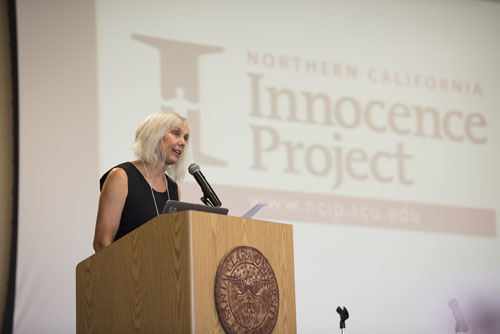
NCIP Policy Director Lucy Salcido Carter addresses the symposium audience. Photo: Joanne H. Lee/Santa Clara University
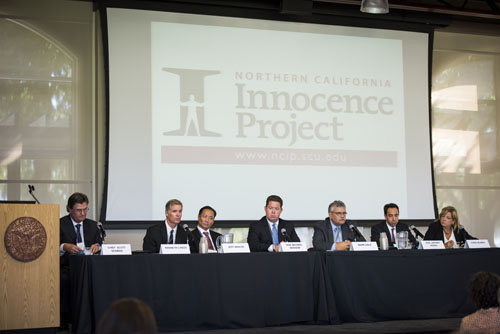
A diverse group of panelists representing a number of perspectives from within the criminal justice system talk about the need for conviction review. Photo: Joanne H. Lee/Santa Clara University
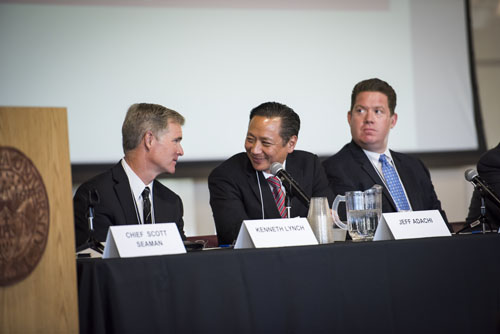
Kenneth Lynch and Jeff Adachi participate in the need for conviction review panel. Photo: Joanne H. Lee/Santa Clara University
